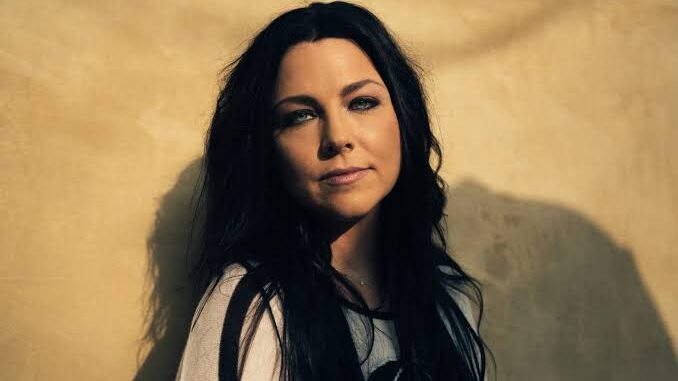
Amy Lee’s journey through the world of music has been nothing short of remarkable—a path paved with raw emotion, haunting melodies, and an unwavering commitment to artistic authenticity. From the moment she emerged on the global stage as the enigmatic frontwoman of Evanescence, Lee captured audiences with a voice that was as ethereal as it was powerful, blending classical sophistication with rock intensity. Her presence was not just a breath of fresh air in a male-dominated genre; it was a storm—unapologetically feminine, fiercely original, and emotionally resonant.
Born in Riverside, California, and raised in Arkansas, Amy Lynn Lee was drawn to music from an early age. With classical piano training and a love for composers like Mozart and Beethoven, her musical foundation was rich and diverse. But it was the moment she discovered bands like Nirvana and Soundgarden that she began to see how her own voice and aesthetic could collide with the world of alternative rock. She wasn’t just a fan—she was a student, absorbing the emotional gravity and sonic intensity that would later define Evanescence’s signature sound.
Lee co-founded Evanescence with guitarist Ben Moody in the mid-1990s, and the pair quickly began crafting songs that blurred genre lines—melding gothic atmospheres with hard-hitting guitars, orchestral arrangements, and deeply personal lyrics. Their breakthrough came in 2003 with the release of Fallen, an album that would catapult them to international fame. Anchored by the Grammy-winning single “Bring Me to Life,” the album sold over 17 million copies worldwide, cementing Evanescence as one of the defining acts of the early 2000s.
But Amy Lee’s success wasn’t simply a product of catchy singles or radio play. What set her apart was her artistic integrity. She fought tirelessly to maintain control over Evanescence’s vision in an industry that often tried to mold her into a more conventional pop persona. Lee resisted those pressures, insisting on creative autonomy—writing her own music, designing album art, and making executive decisions about the band’s direction. Her resolve not only preserved the integrity of the music but also inspired a generation of young women who saw in her a rare kind of role model: one who was both deeply expressive and uncompromisingly strong.
Over the years, Lee’s evolution as an artist has mirrored her personal growth. Albums like The Open Door and Evanescence revealed a more introspective side, touching on grief, resilience, and transformation. Her lyrics have always served as a form of catharsis, allowing fans to connect with her on a deeply emotional level. Whether she’s singing about loss, identity, or empowerment, there is a sincerity in her voice that cuts through even the most densely layered arrangements.
Beyond Evanescence, Lee has ventured into other creative territories with remarkable grace. She’s composed scores for films and video games, collaborated with artists across genres, and even released Dream Too Much, a children’s album inspired by her son. These projects highlight her versatility—not only as a musician but as a creator unbound by genre or expectation. Her ability to reinvent herself while staying true to her essence is a rare gift in an industry that often demands conformity.
What makes Amy Lee’s legacy truly enduring is the way she’s continually used her platform to advocate for artistic freedom and emotional honesty. She’s spoken openly about the challenges she’s faced—sexism in the music industry, creative differences, personal loss—and through it all, she’s remained a symbol of resilience. Her willingness to be vulnerable has helped to destigmatize mental health struggles and encourage conversations about self-worth and healing.
Lee’s influence is evident in the wave of female-fronted rock and metal acts that have followed in her footsteps. Bands like Halestorm, Within Temptation, and Paramore have cited her as an influence, and it’s easy to see why. She broke barriers—not just as a woman in rock, but as an artist who refused to be silenced or sidelined. Her legacy is not one of fleeting fame, but of sustained impact and innovation.
As the years pass, Amy Lee continues to evolve—not just musically, but as a cultural icon. She has gracefully navigated the shifts in the music landscape, embracing new technologies, releasing independent projects, and staying connected to her fanbase through candid communication and meaningful art. Each chapter in her career reveals a deeper layer of who she is: a visionary, a survivor, a force of nature.
Her story is not defined by a single album or performance. It’s a mosaic of moments—triumphs, struggles, reinventions—that come together to form a portrait of one of rock’s most compelling artists. And while her gothic roots remain a core part of her identity, it’s her refusal to be boxed in by them that makes her truly royal.
Amy Lee’s voice—both literal and metaphorical—continues to echo through the halls of modern music. It’s a voice that reminds us that strength can coexist with vulnerability, that beauty can be found in darkness, and that authenticity is the most powerful legacy an artist can leave behind. For fans around the world, she is more than a musician—she is a guide, a mirror, and a muse.
In a world of ever-shifting trends and disposable fame, Amy Lee stands as a reminder of what it means to create something timeless. Her journey from gothic prodigy to rock royalty is not just inspiring—it’s essential. And as long as people seek out music that speaks to the soul, her legacy will endure.

Leave a Reply